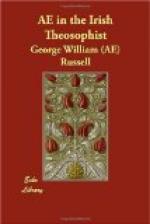Coming from the region of unbelief to belief, to use these words in their narrowest sense, let us consider what way Theosophy will affect a believer in doctrines of some system of religious thought. To take the ordinary Protestant first; Theosophy is apparently likely to fail on account of its taking away the personality of the Deity, and the habit of prayer: for to both of these doctrines the earnest churchman is attached. But if it does do so, what does it substitute? It puts forward an atonement, not an atonement of 1,861 years ago, but a daily atonement to be carried out in each one’s life, and having as great an influence on one’s fellows; it suggests the possibilities are within each one of us, if we but seek the true path. Also, and this is a small point, it removes the horrible canker of church government, which ministers so powerfully to the idea of separateness and personality: and lastly, it offers, in place of mouthing prayers to a God whom one is taught to fear ten times to the once that love is insisted on, a union with that higher self which, if pursued, brings peace, wisdom, an infinite compassion, and an infinite love.
What has Theosophy to offer to the Roman Catholic? All that it offers to the Protestant; with this addition, that not merely one woman is exalted, but all womankind as being of the same essence and spirit of all nature. It shows that there is no superiority, but that by effort, by training, by aspiration, everyone, both man and woman, shall be found worthy of being taken into heaven, and joined again to the one source of life and being. It shows the whole doctrine of saintliness and blessedness to have a source in Truth, though overlaid and altered.
And what of the other sheep? What of that soul which, feeling compelled by its intuitions to recognise the essential divinity of man, yet find no expression in the churches which will fit into its emotional nature? What of him whom, for want of a better word, I shall call a Symbolist, who is always striving to express in some form of art or thought, that divine energy which is wisdom, consciousness, and energy all in one? Does not Theosoophy afford the very best outlet for his soul force? Are not its ideas on a level with, if not higher than, what his most sublime moments of feeling can bring before him? Surely if anyone can find peace in its bosom, the symbolist, ever struggling to express his sense of the True, the Beautiful, which are, after all, but a second reflection of the Higher mind, with its knowledge of the essence of all life, can therein do his noblest work for Humanity in company with those who, having previously done all they could for the race through a sense of duty arising from intuitions they declined to recognise, have found in the doctrines of Theosophy the broadest possible field for such work, and the purest motive.




